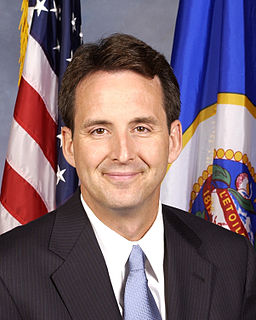A Quote by Tim Pawlenty
I'm a market person, but there are certain circumstances where you've got to have government put up the guardrails or bust up entrenched interests before they become too powerful.
Quote Topics
Related Quotes
Politics and government have been a terrible place to invest; education has been a terrible place to invest, but that is because the entrenched interests make it a terrible place to invest. The way you invest in those sectors is you go against the entrenched interests; you try and disrupt the entrenched interests, not to service them.
The warlords took part in atrocities during the civil war in Afghanistan. They looted, they raped, they killed. They have become incredibly empowered and entrenched. They live in mansions, they have jobs in the government, and they're incredibly powerful. In Kabul, people don't want to speak about it too publicly, because these people are essentially like Tony Soprano.
Our government, National and State, must be freed from the sinister influence or control of special interests. Exactly as the special interests of cotton and slavery threatened our political integrity before the Civil War, so now the great special business interests too often control and corrupt the men and methods of government for their own profit. We must drive the special interests out of politics.
The dreams of "leaving it up to the market" or of returning to a politically neutral gold standard cannot succeed because the nature of the monetary system has a profound impact on the interests of powerful groups and states. Affected groups and states will always try to intervene in the operation of the system to make it serve their interests.
Unable to maintain their government-granted monopoly, the powerful railroad
interests turned to government to do the regulating and price-fixing which they
were unable to do themselves. In fact, the pressure that induced Congress to
enact the Interstate Commerce Act of 1887 did not come from reformers bemoaning
abuses by the powerful railroad interests; it came from the railroad interests
themselves, asking Congress to shield them against the harsh winds of
competition.
The strongest argument for free enterprise is that it prevents anybody from having too much power. Whether that person is a government official, a trade union official, or a business executive. If forces them to put up or shut up. They either have to deliver the goods, produce something that people are willing to pay for, are willing to buy, or else they have to go into a different business.
Across the curve of the earth, there are women getting up before dawn, in the blackness before the point of light, in the twilight before sunrise; there are women rising earlier than men and children to break the ice, to start the stove, to put up the pap, the coffee, the rice, to iron the pants, to braid the hair, to pull the day's water up from the well, to boil water for tea, to wash the children for school, to pull the vegetables and start the walk to market, to run to catch the bus for the work that is paid. I don't know when most women sleep.

































